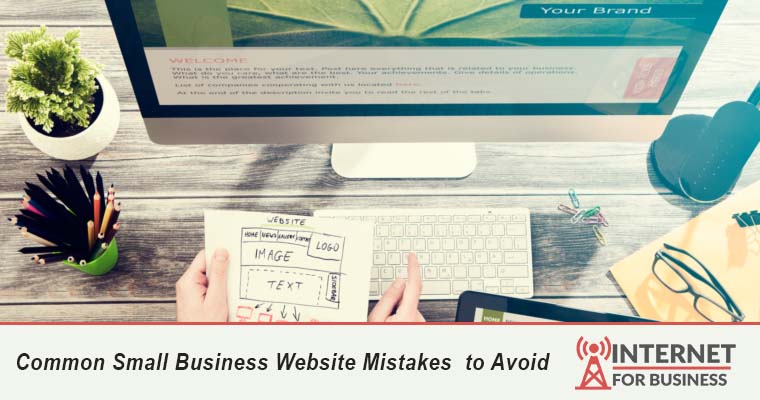Common Small Business Website Mistakes to Avoid

It's not a job you can take lightly, whether you're in the process of building your first website or perfecting an existing one. In reality, 83 percent of small business owners with a website feel a competitive advantage.
Your website should do a variety of things: represent your business, engage and inform your audience, ascend to the top of the results of search engines, act as a sales funnel for your goods and services, collect leads, and seamlessly link to all other digital platforms.
That's why setting yourself up for success at the get-go is so critical. So we're discussing the all-to-common small business website errors owners make in this article, so you don't make the same mistakes yourself!
Suppose you've already decided that you need a new website to be created, or your current one to be substantially updated... which means you've already set up a domain and website host.
Starting without a plan
Do you know what a successful web site's common denominator is? A plan for websites. A website plan allows you to identify goals, milestones, content, and even metrics. The questions below should be answered:
-
Who's your audience here?
-
What are the purpose or aims of your website?
-
Is your website going to need some functionality?
-
What details do you need/want to send visitors to the website?
-
What other web assets are your site going to link to?
-
How do you calculate your achievement?
Defining a plan for a website will help you not only balance making a beautiful website but also achieve something for your business.
You heavily rely on social media (as your website)
Many small business owners worry that they can't have an online presence because they don't know the website code. So as a website, they resort to using a third-party website/social media channel.
You're losing out on possible leads and sales if you rely only on Facebook or another social networking site as a primary business center. You have no influence over changes in content and if they change permissions or policies, you're toast!
Also Read : How to Market Your Business Using The Internet?
The design of your website does not represent your business.
You often see a disparity between the offline and online presence of a small company. Perhaps the branding is off or the professionalism of a brick-and-mortar store is not mirrored on their website. Whatever the case, with your website design, you need to create an effect online.
Yeah, we couldn't have been better at saying this. For making a profitable small business website, a basic website design is important. We hate to say it but it's true: an excessively complex website doesn't turn consumers into site visitors. On a website, an overabundance of stimuli leads to confusion, and they easily escape when a visitor is confused.
In the use of colors, font styles, and elements of design, be pragmatic. And to your benefit, use white space, as it draws eyes into the significant elements on a screen. Stick to the theme of the key design and do not stray from it.

Well-defined prompts to visitor action
On the website of your business, make clear what you want people to do. Believe it or not, individuals like to be told what action they should take!
Here's a fun workout for you...
Think about when and how you can add a call to action on each webpage on your website. Layer in possibilities for conversion such as pop-up forms, warning bars, and pop-ups for timed or exit. All lead types should be click-worthy and popular.
Remember: gathering leads and cultivating them to become consumers is the purpose of your small business website.
Think about delivering something and for free, if you're leery that people would really want to leave personal information with you. People would then be even more likely to share private information such as their name or email address.
Your website was not created for mobile devices.
Here's a simple fact: while 30% of all website traffic comes from a portable device such as a cell phone or tablet, 90% of small business websites are not optimized for the screen sizes of these devices.
If a "responsive website or one designed for these devices is not available, it can push away customers, hinder the rating of your search engine and look unprofessional.
Using Google's mobile-friendly evaluation tool to say whether your small business website is responsive, or needs a little work.
-
Enter your URL first.
-
Then Google will score the mobile-friendliness of your website using helpful color-coded guides.
For example, if your website passes, you will get a green light, a yellow light if there is room for improvement, and a red light if you need a lot of assistance. It ranks anything from mobile page speed to screen capacity.
You are not considering SEO (Search Engine Optimization)
An online experience starts more often than not with a web search. In reality, 3.5 billion searches every day are performed. So, chances are pretty good that somebody is looking for your company or business.
You need to enforce simple SEO on your website in order to make sure your website is found on Google and other search engines. With many ranking variables, Google has a complex algorithm. So as a small business owner, amid increased uncertainty and competition.
Also Read : Must-Have Digital Tools to Grow Your Business
Through outsourcing web task, you relinquish all control
Some small business owners assume or already do that expensive company or contractors outsource web development projects. Although unloading some small business duties on others is helpful, it may not be the best idea for your website to be one of them.
Why? Outsourcing your website, for instance, makes it hard to make adjustments when and when you want. To get a small website tweak done, you have to go through many individuals or even wait weeks at a time.
This mistake again suggests a greater loss of control. It results in additional expense, time, and headaches when you outsource and have no control over your OWN platform.
For example, on your website, you want to update your company email. So you're sending your outsourced web developer an update, but he's on summer vacation overseas for the next few weeks. You wait a few weeks, then to hear back from him and when you do, he quotes $600 for that small change.
Expense. Time. Headaches. This can all be stopped
Also Read : Things to Consider when Launching a Small Business Website
You let imagination outweigh conversion.
There is a function for your website to play. It needs to provide the right information to individuals, the next steps, and be user-friendly. To serve that function, engineer your material, layout, and design.
You should not think of your website as a digital billboard with a flashy logo. It should instead be a lead-generating machine that supports the bottom line of your business.
Set and forget about it
Many small business owners make the mistake of quitting their site after publishing it but the maintenance of the website is not a "one-and-done" assignment.
Instead, the website should be regularly refreshed based on how it works. Take a lead (we like Google Analytics) from your web analytics. For example, if you have a page with low traffic, you might think about ways to connect to it from other pages to rev up the number of visits.
Another advantage of maintaining a new website has to do with SEO. Blogs and social content offer small business owners the ability, which is one of Google's many ranking factors, to create new website content.
Related Articles:
Best Practices to Protect your business Email
How to Maintain Security with Remote Employees
How Businesses Can Use Chatbots To Increase Profits
Related Posts
Mon, Apr 20, 2020 11:13 PM
Business Internet Guides for Entrepreneurs
Small businesses need to grow, but how big should your business become before you buy it online? Whether you started out as a sideshow or a brick-and-mortar business, successful small businesses are finding it increasingly difficult to decide when to shell out money for an Internet business.
Wed, Apr 22, 2020 11:34 PM
Find Verizon Internet for Business Near You!
Verizon provides Internet for business in more than 40 states in the US, speeds are limited to 15 Mbps, and many businesses will need more juice. If you're in the Northeast, you can enjoy high-speed Internet via Verizon's FiOS. This is ideal for businesses that need high speeds, such as restaurants, hotels, medical facilities, hospitals, schools, and other businesses.
Thu, Apr 23, 2020 12:00 AM
5 Best Small Business Internet Service Providers (2021)
The following Internet Service Providers are not listed in any particular order, but we have ranked these five companies as worthwhile due to some key factors such as speed, reliability, cost, and overall customer satisfaction.
Thu, Apr 23, 2020 11:52 PM
Why Business Internet is More Expensive Than Residential Internet
This question is asked so often today that it seems worth explaining, but here are 5 reasons why business Internet is more expensive than Residential Internet packages.
Fri, Apr 24, 2020 5:17 AM
Comcast Internet For Business: Internet, Phone, TV, and Other Solutions for your Business.
Comcast Business is US largest cable provider for small and medium-sized businesses and has become a force in the market, recognized by leading industry over the past two years as one of the fastest-growing providers of high-speed broadband to business customers




